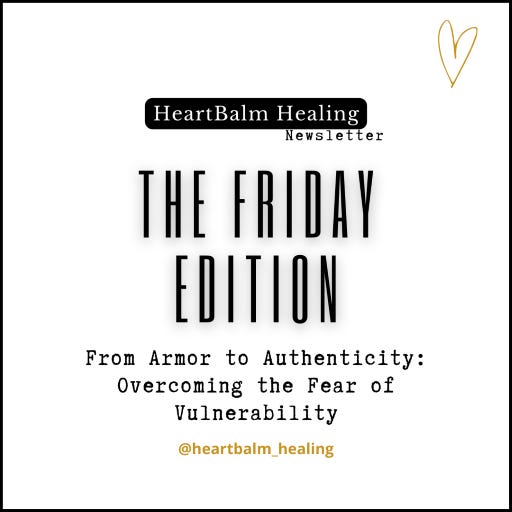From Armor to Authenticity: Overcoming the Fear of Vulnerability
The Friday Edition | No. 22
From Armor to Authenticity: Overcoming the Fear of Vulnerability
The word vulnerability comes from the Latin “vulnero” which means “to wound.” Therefore, vulnerability is our capacity to be wounded.
For many with complex trauma, vulnerability can be the kryptonite that drives us from connection, healthy relationships, and opening up to life fully. We can hold ourselves back out of a fear of rejection, loss, failure, shame, and abandonment. Additionally, the risk of being re-traumatized is an overwhelming pain that can keep us walled off, and push us to stay in the dark edges of life and living. It is a grave and fundamental wound that holds us back from achieving the dreams we have for ourselves, allowing ourselves to love and be loved in return, and thrive in the world. Vulnerability can feel like standing on the edge of a cliff, teetering between our authentic selves and the fear of rejection, and feeling unprotected. It's the uncertainty of baring our souls, exposing our wounds, and risking profound emotional discomfort.
Vulnerability is usually attacked, not with fists but with shaming. Many children learn quickly to cover up any signs of weakness, sensitivity, and fragility, as well as alarm, fear, eagerness, neediness, or even curiosity. Above all, they must never disclose that the teasing has hit its mark. Carl Jung explained that we tend to attack in others what we are most uncomfortable with in ourselves. When vulnerability is the enemy, it is attacked wherever it is perceived, even in a best friend.
_Gabor Mate, “Hold On to Your Kids: Why Parents Need to Matter More Than Peers”
If you experienced childhood trauma you developed an innate survival response to protect and defend yourself. This can take many forms and keep us from growing in a soft, safe place of life. As the child grows and these protections are kept in place it becomes a fortress around our heart that hardens and develops even more reasons and defenses against exposing ourselves and being vulnerable. Yet, it is the soft spaces
Keep reading with a 7-day free trial
Subscribe to HeartBalm to keep reading this post and get 7 days of free access to the full post archives.




